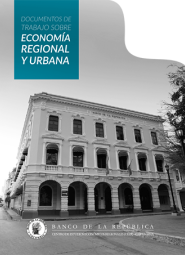Minutes of the Meeting of the Board of Directors of Banco de la República on Friday, March 24, 2017
A regular meeting of the Board of Directors of Banco de la República took place in the city of Bogotá D.C. on Friday, March 24, 2017. In attendance were Mauricio Cárdenas Santamaría, Minister of Finance and Public Credit; Juan José Echavarría, Governor of the Central Bank; and Board Members Gerardo Hernández Correa, Ana Fernanda Maiguashca Olano, Adolfo Meisel Roca, and Juan Pablo Zárate Perdomo.
These minutes contain a summary of the outlook on the macroeconomic situation by the technical staff of the Central Bank (section 1), followed by a review of the main discussion regarding monetary policy by the Board of Directors (section 2).
Further detail on the macroeconomic situation prepared by the technical staff from the Central Bank will be presented in the monthly Monetary Policy Report for February 2017 and in the statistical annex (Only available in Spanish).
1. MACROECONOMIC CONTEXT
- The information available for supply and demand suggests that the annual growth of the Colombian economy at the beginning of the year continued to be weak and slightly less than expected. However, the forecast of a more balanced growth of the different components of demand was maintained for all of 2017. Better performance of investment in civil works is expected, which would enable a 2.0% GDP growth for the year as a whole. However, to date, there is no information regarding the recent performance of this sector.
- On the other hand, the current account of the balance of payments recorded a deficit of USD $12,541 m during 2016 (i.e., 4.4% of GDP). The result was lower by USD $6,239 m versus a year ago (6.4% of GDP). The lower current account deficit was the result of a significant drop in outflows, which more than offset the reduction in income especially due to the fall in exports of goods.
- As for inflation, it stood at 5.18% on a yearly basis in February, (29 bp lower than in January). Core inflation, measured as the average of the four indicators monitored by the Central Bank, continued with no significant changes. The available information suggests that, as happened last month, part of the observed increase in consumer prices was due to the impact of the tax reform (by the change in the VAT, the green tax, and the Liquor Act).
- Measures of inflation expectations by economic analysts to December 2017 and to 12 and 24 months lowered, as did those embedded in public debt bonds to 2, 3, and 5 years.
- Regarding the external context, the most recent indicators for the advanced economies suggest improvement of their activity. However, in Latin America, the data available suggest that growth continues to be mediocre.
- Also, during the first weeks of March, the Latin American currencies depreciated. However, this trend was reversed in the last few days, despite the increase in the Fed’s interest rate. Important capital inflows to emerging economies continue to take place, mainly to fixed income.
- So far in March, international oil prices have shown a downward trend in response to the higher inventories in the United States.
- For 2017, it is expected that the strong transitory shocks that diverted inflation from its target continue to fade, in an environment of a weak economic activity. On the other hand, the increase in value-added tax and other indirect taxes would pressure inflation upwards. The monetary policy actions undertaken so far, which consider these effects, should strengthen convergence of inflation to its target.
2. DISCUSSION AND POLICY OPTIONS
The Board Members highlighted that headline inflation continues on its descending path and that recent data continue to show weakness in the economic activity in this first part of the year.
The majoritarian group voted to reduce the benchmark interest rate by 25 pb. Among their arguments, the following stand out: inflation expectations resumed their downward trend; the recent data on economic activity continued to exhibit deceleration in terms of growth; credit, particularly the commercial portfolio, is growing at low rates; and the current stance of the benchmark interest rate continues to be contractionary. Some of them highlighted the negative behavior of several components of the CPI that are strongly related to indexation and persistence phenomena. In their opinion, the risks of excessive deceleration and persistence of inflation have risen simultaneously, increasing the uncertainty about the pace at which further reductions to the interest rates should take place.
One member of the Board voted in favor of maintaining the benchmark interest rate unaltered. His/her arguments focused on the increasing persistence of inflation that seems to be appearing in the Colombian economy. This factor, added to the supply shocks in recent years, suggests the desirability of maintaining a more contractionary monetary policy in order to ensure the early convergence of inflation to its target, thus avoiding damages to credibility that would cause this process to be more expensive in the future. The impact of the increase in the VAT is still uncertain and should be assessed very carefully during the coming months.
Finally, another Board Member voted for a 50-bp reduction in the benchmark interest rate. S/he indicated that, facing the low dynamics of the economy, it is desirable that the reduction of interest rates be done early in order to produce a timely effect on the economic activity. S/he also considers that inflation risks have reduced considerably in recent months, for which reason s/he believes that the risk of an excessive deceleration should prevail in the balance of risks.
3. POLICY DECISION
The Board of Directors of Banco de la República, by majority, decided to reduce the benchmark interest rate by 25 bp to 7.0% at today’s meeting.
The decision to reduce the benchmark interest rate was approved by four members of the Board. One Board Member voted to maintain the benchmark interest rate unchanged, and another one to reduce it by 50 bp.
Bogotá D.C., 7 April 2017





















































